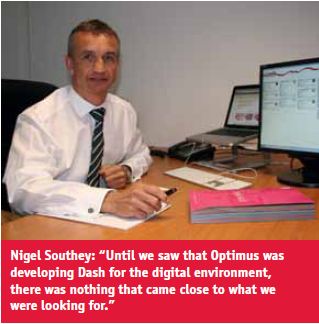Nigel Southey is clear about the key benefit of the Optimus Dash MIS that Colyer London has implemented at its Vine Hill premises. “It’s going to make us more profitable because we will know the real costs of what we produce and the real prices of materials. We are going to save a fortune on materials,” says the managing director.
Colyer London operates in three distinct areas: Computing, which supplies Apple computers, Xerox printers and Adobe applications; Stationery which provides creative stationery products and Printing, which is an all digital operation based around cut sheet and large format inkjet.
While the first two divisions are straightforward to manage in terms of costs and margins because they are based on products with known costs and prices, the same does not apply to print where every job is different. “Print has been very difficult to quote for. It can cover brochures to pop up stands and banners, reports to canvas prints. The biggest issue we had was that we really didn’t have much clue what the cost was because there are so many different elements involved. We worked on assumed margins, but we didn’t really understand how profitable each customer or each job was,” Southey says. And nobody, himself included, liked producing quotes.
This could not go on and about 18 months ago Southey started to look for an MIS to bring this under control. The problem he quickly found was that MIS for print was designed for sheetfed litho, not for digital where the materials could be film or canvas rolls as easily as they could be cut sheet papers. “Until we saw that Optimus was developing Dash for the digital environment there was nothing that came close to what we were looking for. Dash was the first that ticked all the boxes I wanted.
“We needed something that was server based, that could be accessed from anywhere because we have people that work from home, and that would hold all production and job data in one place so that everyone was looking at the same information.”
Implementation of Dash began in June with the steady building of job templates over the summer. Templates are crucial to Dash. There is a template for each type of job that the company can produce on its range of equipment. In Colyer London’s case this includes a flatbed Océ Arizona inkjet press, Esko cutting table and the latest Xerox 8080 cutsheet colour machine. The parameters for each machine are included to prevent jobs being offered that is the wrong format or unsuitable materials.
There is a big investment in time in creating these templates, but once completed the quoting process is simplicity itself. It is a matter of pulling the customer details from the system, adding a job reference and then filling in the required fields for that job. Dash works out the best way to produce it on the given equipment and comes back with a true price, taking account of allocated time, depreciation, labour and material costs. It is simple enough that anyone can generate a quote in minute.
For the first time Colyer London can see clearly what each job is costing. There’s a suggested price and break down of all the cost elements so that any negotiations take place with real understanding of their impact on the business. “We had one regular job which we had priced on the assumption that we would print it two-up, but when checking through Dash we discovered that we could only get one set out of a sheet, so were using twice the machine time and twice the paper we expected. We discovered instead of a good margin we were losing money on the job,” he explains. While it could be argued that this sort of issue ought to be sorted earlier, Southey points out that with the sheer number of jobs passing through and the short run nature of each, this simply is not possible in a small business.
Previously with instruction sheets for each job it was difficult to know how many jobs were in the building. Dash has solved this, each job is tracked and its progress shown on screen using colour to highlight any issues.
Dash has also delivered on the first aim of providing a real view into the cost side of the business and in generating quotes rapidly and easily. The speed of delivering a quote can make the difference between winning and missing a job Southey says, especially when his customer base is creative agencies and companies used to expecting everything “yesterday”. It has also taken control of material usage and costs. “We didn’t know what we were using on any one job so needed something that would give us an understanding of wastage levels and what was in stock at any one time. The materials used on the wide format printer can be very expensive and even on the Xerox some papers are more expensive per sheet than the click charge,” he says.
Dash has delivered here. Once a quote becomes a job, material is allocated or if not in stock, will be ordered from the supplier. For example Colyer now knows how much wrapping material is used per job and can include this in its price. “We use a fantastic amount of bubble wrap,” Southey continues.
The stock system is now live and the links to the Sage accounts has gone live with the new financial year. The future could include web to print portals, CRM for the sales team and even more sophisticated tracking. For now Southey is delighted that Dash has put him in control of the business.
“We are going to make more profit,” he says.
22-26 Vine Hill
London
EC1R 5LJ
t: 020 7833 0888
For more information about Colyer visit the website at www.colyer.co.uk
Article cortesy of Print Business Magazine 20th January 2012
Filed under: Digital, Optimus Dash, Return on Investment, UK |




Leave a comment